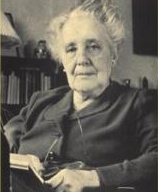Melanie Klein
페이지 정보
작성자 연구소 작성일12-08-15 04:26 조회761회 댓글0건관련링크
본문
Melanie Reizes Klein (30 March 1882 ? 22 September 1960) was an Austrian-born British psychoanalyst who devised novel therapeutic techniques for children that had an impact on child psychology and contemporary psychoanalysis. She was a leading innovator in theorizing object relations theory.
Born in Vienna of Jewish parentage, Klein first sought psychoanalysis for herself from S?ndor Ferenczi when she was living in Budapest during World War I. There she became a psychoanalyst and began analysing children in 1919. Allegedly two of the first children she analyzed were her son and daughter. In 1921 she moved to Berlin, where she studied with and was analysed by Karl Abraham. Although Abraham supported her pioneering work with children, neither Klein nor her ideas received much support in Berlin. However, impressed by her innovative work, British psychoanalyst Ernest Jones invited Klein to come to London in 1926, where she worked until her death in 1960.
Klein had a major influence on the theory and technique of psychoanalysis, particularly in Great Britain. As a divorced woman whose academic qualifications did not even include a bachelor's degree, Klein was a visible iconoclast within a profession dominated by male physicians.
After the arrival of Sigmund Freud and his psychoanalyst daughter, Anna, in London in 1938, Klein’s ideas came into conflict with those of Continental analysts who were migrating to Britain. Following protracted debates between the followers of Klein and the followers of Anna Freud during the 1940s (the so-called 'controversial discussions'), the British Psychoanalytical Society split into three separate training divisions: Kleinian, Anna Freudian, and independent. This division remains to the current time.
Apart from her professional successes, Klein’s life was full of tragic events. Allegedly the product of an unwanted pregnancy, she had little affection from her parents. Her much loved elder sister died when Klein was four, and she was made to feel responsible for her brother’s death. Her academic studies were interrupted by marriage and children. Her marriage failed and her son died in a climbing accident that may have been a suicide, while her daughter, whom Klein had analyzed as a child, the well-known psychoanalyst Melitta Schmideberg, fought her openly in the British Psychoanalytic Society. Her daughter's analyst at the time, Edward Glover, openly challenged Klein in the British Society meetings. Mother and daughter were not reconciled before Klein's death, and Schmideberg did not attend Klein's funeral.
External source:
Concise Dictionary of National Biography
Horacio Etchegoyen: The Fundamentals of Psychoanalytic Technique, Karnac Books ed., New Ed, 2005.
Robbins, B.D. & Goicoechea, J. (2006). pp.191-223.
Ben Brantley,"Theater Review: Uta Hagen returns, tossing Wine," New York Times, October 25, 1995.
Born in Vienna of Jewish parentage, Klein first sought psychoanalysis for herself from S?ndor Ferenczi when she was living in Budapest during World War I. There she became a psychoanalyst and began analysing children in 1919. Allegedly two of the first children she analyzed were her son and daughter. In 1921 she moved to Berlin, where she studied with and was analysed by Karl Abraham. Although Abraham supported her pioneering work with children, neither Klein nor her ideas received much support in Berlin. However, impressed by her innovative work, British psychoanalyst Ernest Jones invited Klein to come to London in 1926, where she worked until her death in 1960.
Klein had a major influence on the theory and technique of psychoanalysis, particularly in Great Britain. As a divorced woman whose academic qualifications did not even include a bachelor's degree, Klein was a visible iconoclast within a profession dominated by male physicians.
After the arrival of Sigmund Freud and his psychoanalyst daughter, Anna, in London in 1938, Klein’s ideas came into conflict with those of Continental analysts who were migrating to Britain. Following protracted debates between the followers of Klein and the followers of Anna Freud during the 1940s (the so-called 'controversial discussions'), the British Psychoanalytical Society split into three separate training divisions: Kleinian, Anna Freudian, and independent. This division remains to the current time.
Apart from her professional successes, Klein’s life was full of tragic events. Allegedly the product of an unwanted pregnancy, she had little affection from her parents. Her much loved elder sister died when Klein was four, and she was made to feel responsible for her brother’s death. Her academic studies were interrupted by marriage and children. Her marriage failed and her son died in a climbing accident that may have been a suicide, while her daughter, whom Klein had analyzed as a child, the well-known psychoanalyst Melitta Schmideberg, fought her openly in the British Psychoanalytic Society. Her daughter's analyst at the time, Edward Glover, openly challenged Klein in the British Society meetings. Mother and daughter were not reconciled before Klein's death, and Schmideberg did not attend Klein's funeral.
External source:
Concise Dictionary of National Biography
Horacio Etchegoyen: The Fundamentals of Psychoanalytic Technique, Karnac Books ed., New Ed, 2005.
Robbins, B.D. & Goicoechea, J. (2006). pp.191-223.
Ben Brantley,"Theater Review: Uta Hagen returns, tossing Wine," New York Times, October 25, 1995.
댓글목록
등록된 댓글이 없습니다.



